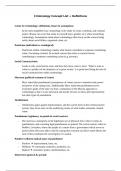Summary
Summary Relevant Concept List - explained with examples where necessary
- Course
- Institution
Hi, this is a bullet point summary of all concepts you are expected to know before the Introduction into Criminology for Social Science Students exam
[Show more]



